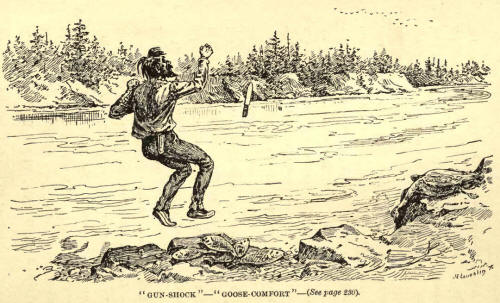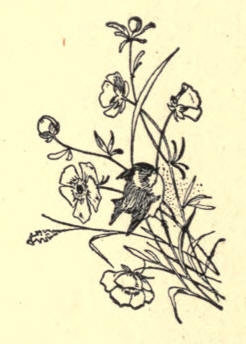|
FATHER had suggested two
plans for immediate action : One was to send William out to the plains to
trade some provisions; the other was to send me to the site of the new
mission, and have me make some hay and plough some land ready for next
spring, and thus take up the ground.
Mr. Woolsey decided to act on
both. The former was very necessary, for we were living on duck, rabbits,
etc., and the supply was precarious.
William took an Indian as his
companion, and I a white man, by the name of Gladstone, as mine.
We travelled together as far
as the river. This time we took a skiff Mr. Woolsey had on Smoking Lake.
We took this as far as we
could by water and then loaded it on to a cart, and when we reached the
river we took William's carts apart and crossed them over, and he and his
companion started out to look for provisions, while Gladstone and myself to
put up hay and plough land.
For the former we had two
scythes, and for the latter a coulterless plough; but we had a tremendously
big yoke of oxen.
We pitched our lodge down on
the bank of the river and went to work; but as we had to hunt our food as
well as work, we did not rush things as I wanted to.
My companion had been a long
time in the Hudson's Bay Company's service, but was a boat-builder by trade,
and knew little about either haymaking or ploughing or hunting; but he was a
first-rate fellow, willing always to do his best. He told me that though he
had been in the country for a long time, he had seldom fired a gun and had
never set a net.
We had between us a
single-barrelled shotgun, percussion-lock, and a double-barrelled flintlock.
The first thing we did was to
make some floats, and put strings on some stones, and I tied up a net we had
and we crossed the river, and set it in an eddy; then we fixed up our
scythes and started in to cut hay on the ground where we intended to plough.
We had several horses with
us, and these and the oxen gave us a lot of trouble. Many an hour we lost in
hunting them, but we kept at it.
At first our food supply was
good. I caught several fine trout in my net, and shot some ducks and
chickens. We succeeded in making two good-sized stacks of hay.
Then we went to ploughing,
but our oxen had never pulled together before—good in the cart, but hard to
manage in double harness. It was not until the second day, after a great
deal of hard work, that we finally got them to pull together.
Then our plough, without a
coulter, bothered us tremendously; but we staked out a plot of ground, and
were determined, if possible, to tear it up.
Once our oxen got away, and
we lost them for three days. "Glad," as I called him, knew very little about
tracking, and I very little at that time, but the third day, late in the
evening, I came across the huge fellows, wallowing in pea- vine almost up to
their backs, and away they went, with their tails up, and I had to run my
horse to head them off for our tent.
One morning, very early, I
was across looking at my net, and caught a couple of fine large trout.
Happening to look down the river, I saw some men in single file coming along
our side, keeping well under the bank. My heart leaped into my mouth as I
thought of a war- party; but as I looked, presently the prow of a boat came
swinging into view around the point, and I knew these men I saw were
tracking her up.
What a relief, and how
thankful I was to think I might hear some news of home and father and the
outside world, for though it was now more than four months' since I left
home, I had not heard a word. I hurried up and fixed my net, and pulled
across and told Glad the news about the boat, and he was as excited as
myself.
Isolation is all very fine,
but most of us soon get very tired of it. I for one never could comprehend
the fellow who sighed, "Oh, for a lodge in some vast wilderness!" Very soon
the boat came to us, and we found that it contained the chief factor,
William Christie, Esq., and his family, and was on its way to Edmonton. Mr.
Christie told me about father passing Canton in good time some weeks since,
and assured me that he would now be safe at home at Norway House. He said
that there was no late packet and he had no news from the east.
He went up and looked at our
ploughing, and laughed at our lack of coulter. "Just like Mr. Woolsey, to
bring a plough without a coulter," said he; but the same gentleman bought a
lot of barley of us some three years after this.
They had hams of buffalo meat
hanging over the prow and stern of their boat. I offered them my fish,
hoping they would offer me some buffalo meat. They took my fish gladly, but
did not offer us any meat. This was undoubtedly because they did not think
of it, or they would have done so, but both Glad and I confessed to each
other afterwards our sore disappointment.
However, we ploughed on.
One morning I had come ashore
from the net with some fish in my boat, and, going up to the tent, Glad went
down to the river to clean them. In a little while I looked over the bank,
and, sitting within a few feet of Glad (who was engaged with the fish, just
at the edge of the water), was a grey goose, looking earnestly at this
object beside him; but as Glad made no sudden movement, the goose seemed to
wonder whether this was alive or not. I slipped back for my gun and shot the
goose, and Glad who thought somebody was shooting at him, jumped for his
life, but I pointed to the dead goose and he was comforted.
Philanthropists make a great
mistake when they begin to comfort others through their heads. Let them
begin at their stomachs, which makes straighter and quicker work.

We were still three or four
days away from our self-set task, when, as if by mutual agreement, the fish
would not be caught, the ducks and geese took flight south, and the chickens
left our vicinity. To use a western phrase, "The luck was agin' us." We had
started with two salt buffalo tongues as our outfit, when we left Mr.
Woolsey. We had still one of these left. We boiled it, and ate half the
first day of our hard luck. We worked harder and later at our ploughing the
second day. We finished the tongue and ploughed on. The third day we
finished our task about two o'clock, and then I took my gun and hunted until
dark, while Glad gathered and hobbled the horses close to camp. Not a rabbit
or duck or chicken did I see.
If ii had been a pagan
Indian, I would have said, "Mine enemy hath done this. Somebody is working
bad medicine about me." But I had long before this found out that the larder
of a hunter or fisherman is apt to be empty at times.
Glad and I sat beside our
camp-fire that night, and were solemn and quiet. There was a something
lacking in our surroundings, and we felt it keenly. For a week we had been
on very short "commons," and since yesterday had not tasted any food, and
worked hard. In the meantime, there is no denying it, we were terribly
hungry.
Early next morning we took
down our tent and packed our stuff. We had neither pack nor riding-saddles,
as we had come this far with William, and we had hoped that he would have
returned before we were through our work; but going on the plains was going
into a large country.
You might strike the camp
soon, or you might be weeks looking for them, and when you found the
Indians, they might be in a worse condition as to provisions than you were.
This all depended on the buffalo in their migrations —sometimes here, and
again hundreds of miles away. William may turn up any time, and it may be a
month or six weeks before we hear from him. As it is, Glad and I do the best
we can without saddles, and start for home.
Having the oxen, we went
slow.
After travelling about ten
miles, I saw someone coming towards us, and presently made out that it was a
white man, and I galloped on to meet him, and found that it was Neils, the
Norwegian, who was with Mr. Woolsey. He was on foot, but I saw he had a
small pack on his back, and my first question was, "Have you anything to
eat?" and he said he had a few boiled tongues on his back. Then I told him
that Glad and I were very hungry, and would very soon lighten his pack. He
told me Mr. Woolsey had become anxious about us, and at last sent him to see
if we were still alive. When Glad came up, we soon showed Neils that our
appetites were fully alive, for we each took a whole tongue and ate it; then
we split another in two and devoured that. And now, in company with Neils,
we continued our journey, reaching Mr. Woolsey's the same evening, but
making great attempts to lower the lakes and creeks by the way, for our
thirst after the salt tongues was intense.

|
